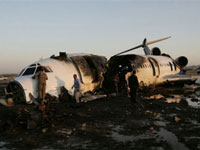Preliminary investigation into Turkish air crash indicated neither technical fault nor sabotage
The last week's plane crash in southwest Turkey killed 57 people, but a preliminary investigation indicated neither a technical fault nor sabotage.

Ali Ariduru, who heads the authority, said the plane was not on the course that it was supposed to follow but refused to say whether preliminary findings suggested that pilot error might have led to the crash.
He said the exact cause would only be known after the flight data and cockpit voice recorders are analyzed.
The recorders were recovered Friday afternoon and are going to be sent abroad to be studied, he said. Local media reports earlier said the recorders had been sent to the United States.
"It was not on its correct course, that's for sure," Ariduru said. "There must be a reason why it left its correct flight course, but we cannot know why until the equipment have been deciphered."
The Atlasjet MD-83 was flying from Istanbul to Isparta in Turkey's southwest early Friday morning when it crashed, killing 50 passengers and seven crew members.
Ariduru said there was neither a "finding to suggest a fire or a sabotage," nor evidence of technical failure. He said weather and visibility were good when the plane crashed.
Military helicopters with thermal cameras spotted the wreckage on a hill hours after the plane crashed. Bodies strapped to seats, clothes and pieces of scrap metal were strewn across a large area. No one survived the crash.
A group of physicists working on a national nuclear project were among the victims, and a memorial service and funeral was held for two of them at Istanbul's Bosporus University on Monday. Many of the victims were buried on Saturday.
Subscribe to Pravda.Ru Telegram channel, Facebook, RSS!




